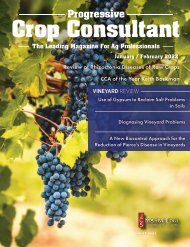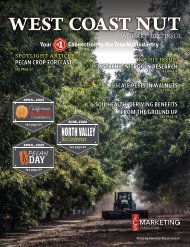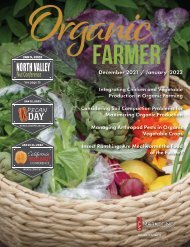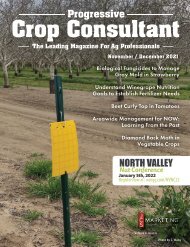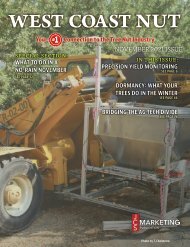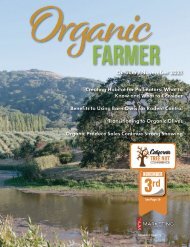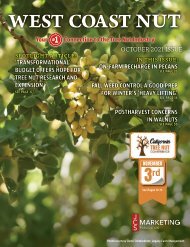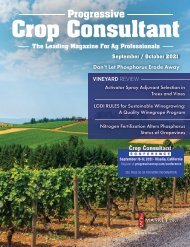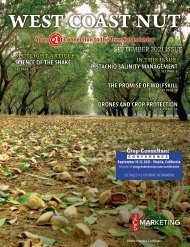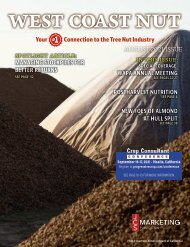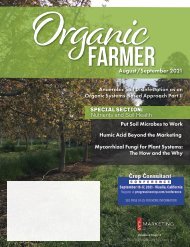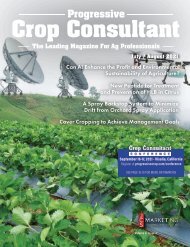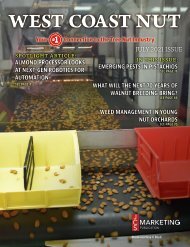WCN Dec e
You also want an ePaper? Increase the reach of your titles
YUMPU automatically turns print PDFs into web optimized ePapers that Google loves.
RESTORING SOIL HEALTH AND<br />
ECOSYSTEM SERVICES IN CALIFORNIA’S<br />
ALMOND ORCHARDS<br />
By ERYN WINGATE | Agronomist, Tri-Tech Ag Products, Inc.<br />
Sustaining agricultural production<br />
through climate change,<br />
prolonged drought and economic<br />
pressure largely depends on the soil’s<br />
ability to support high-yielding crops<br />
under increasing stress and resource<br />
scarcity. California’s almond industry<br />
garners public scrutiny for its high<br />
water consumption and environmental<br />
impact. Yet, growers have installed<br />
microsprinklers and other irrigation<br />
system upgrades, successfully decreasing<br />
water usage by 33% since 1990. The<br />
Almond Board pledged to decrease<br />
consumption another 20% by 2025.<br />
Meeting water conservation goals<br />
requires a multipronged approach, and<br />
soil health management can contribute<br />
to the puzzle.<br />
While water usage rightly receives<br />
public attention, the environmental<br />
impacts incurred by poor soil quality<br />
also deserve urgent consideration. Marginal<br />
cropland with low organic matter<br />
maintains productivity by spoon feeding<br />
fertilizer and water. Compaction,<br />
salt accumulation, nutrient imbalances<br />
and soilborne diseases compromise<br />
yield and increase the amount of water,<br />
fertilizer and pesticides needed to<br />
maintain yields. Ag chemicals runoff<br />
into surface waters and leach down to<br />
aquifers. Nitrous oxide and methane<br />
emissions contribute to climate change.<br />
Yet, food production and environmental<br />
protection goals do not need to<br />
remain at odds. Adopting management<br />
strategies that increase soil organic<br />
matter can slowly transform agricultural<br />
lands to provide significant ecological<br />
benefits while promoting crop<br />
health and vigor.<br />
Nut crops may require a lot of water,<br />
but soil conservationists advocate<br />
farming systems designed around permanent<br />
crops that offer greater carbon<br />
sequestration potential than heavily<br />
tilled annuals. Tillage depletes organic<br />
matter by disturbing the ecology<br />
and exposing soil to the air. Microbes<br />
previously limited by low oxygen concentration<br />
suddenly accelerate growth,<br />
oxidizing soil carbon faster than it can<br />
be fixed. Annual net carbon loss ensues,<br />
compromising soil structure and fertility.<br />
Orchard and vineyard soils can<br />
remain undisturbed for many years,<br />
allowing enough time to accumulate<br />
organic matter and reap the environmental<br />
and agronomic benefits.<br />
Organic Matter Does It All<br />
Organic matter improves almost<br />
every aspect of soil health, including<br />
28 West Coast Nut <strong>Dec</strong>ember 2021




